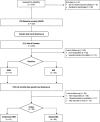Psychological factors and the uptake of preventative measures in BRCA1/2 pathogenic variant carriers: results of a prospective cohort study
- PMID: 36536421
- PMCID: PMC9761978
- DOI: 10.1186/s13053-022-00244-y
Psychological factors and the uptake of preventative measures in BRCA1/2 pathogenic variant carriers: results of a prospective cohort study
Abstract
Background: Women carrying BRCA1/2 pathogenic variants are exposed to elevated risks of developing breast cancer (BC) and are faced by a complex decision-making process on preventative measures, i.e., risk-reducing mastectomy (RRM), and intensified breast surveillance (IBS). In this prospective cohort study we investigated the effect of anxiety, personality factors and coping styles on the decision-making process on risk management options in women with pathogenic variants in BRCA1/2.
Methods: Breast cancer unaffected and affected women with a pathogenic variant in the BRCA1 or BRCA2 gene were psychologically evaluated immediately before (T0), 6 to 8 weeks (T1) and 6 to 8 months (T2) after the disclosure of their genetic test results. Uptake of RRM and IBS was assessed at T2. Psychological data were gathered using questionnaires on risk perception, personality factors, coping styles, decisional conflict, depression and anxiety, including the Hospital Anxiety and Depression Scale (HADS). We performed tests on statistical significance and fitted a logistic regression based on significance level.
Results: A total of 98 women were included in the analysis. Baseline anxiety levels in women opting for RRM were high but decreased over time, while they increased in women opting for intensified breast surveillance (IBS). Elevated levels of anxiety after genetic test result disclosure (T1) were associated with the decision to undergo RRM (p < 0.01; OR = 1.2, 95% CI = 1.05-1.42), while personal BC history and personality factors seemed to be less relevant.
Conclusions: Considering psychosocial factors influencing the decision-making process of women with pathogenic variants in BRCA1/2 may help improving their genetic and psychological counselling. When opting for IBS they may profit from additional medical and psychological counselling.
Trial registration: Retrospectively registered at the German Clinical Trials Register under DRKS00027566 on January 13, 2022.
Keywords: Anxiety; Breast cancer, familial; Decision making; Risk reduction behavior; Risk-reducing mastectomy.
© 2022. The Author(s).
Conflict of interest statement
The authors declare that they have no competing interests.
Figures


Similar articles
-
Psychological distress and decision-making factors for prophylactic bilateral mastectomy in cancer-unaffected BRCA1/2 pathogenic variant carriers.Psychooncology. 2023 Apr;32(4):640-648. doi: 10.1002/pon.6111. Epub 2023 Mar 7. Psychooncology. 2023. PMID: 36774644
-
Effectiveness of evidence-based decision aids for women with pathogenic BRCA1 or BRCA2 variants in the german health care context: results from a randomized controlled trial.BMC Med Inform Decis Mak. 2023 Oct 16;23(1):223. doi: 10.1186/s12911-023-02327-9. BMC Med Inform Decis Mak. 2023. PMID: 37845719 Free PMC article. Clinical Trial.
-
Evaluation of two evidence-based decision aids for female BRCA1/2 mutation carriers in Germany: study protocol for a randomised controlled parallel-group trial.Trials. 2022 Feb 16;23(1):157. doi: 10.1186/s13063-022-06081-7. Trials. 2022. PMID: 35172875 Free PMC article.
-
Effectiveness of decision aids for female BRCA1 and BRCA2 mutation carriers: a systematic review.BMC Med Inform Decis Mak. 2019 Aug 1;19(1):154. doi: 10.1186/s12911-019-0872-2. BMC Med Inform Decis Mak. 2019. PMID: 31370837 Free PMC article.
-
Decision making, psychological wellbeing and psychosocial outcomes for high risk women who choose to undergo bilateral prophylactic mastectomy - A review of the literature.Breast. 2016 Aug;28:130-5. doi: 10.1016/j.breast.2016.05.012. Epub 2016 Jun 15. Breast. 2016. PMID: 27318167 Review.
Cited by
-
Acceptance and attitudes towards genetic cancer testing among German general practice patients: a cross-sectional survey.Fam Med Community Health. 2025 Jul 31;13(3):e003395. doi: 10.1136/fmch-2025-003395. Fam Med Community Health. 2025. PMID: 40744658 Free PMC article.
-
Translation, cultural adaptation, and pilot testing of the German cancer worry scale among BRCA1/2 pathogenic variant carriers in Austria.Hered Cancer Clin Pract. 2025 May 19;23(1):17. doi: 10.1186/s13053-025-00316-9. Hered Cancer Clin Pract. 2025. PMID: 40390061 Free PMC article.
-
Quality of life after risk reducing mastectomy in a Portuguese cohort of BRCA pathogenic/likely pathogenic variant carriers.J Cancer Res Clin Oncol. 2025 May 30;151(5):177. doi: 10.1007/s00432-025-06231-9. J Cancer Res Clin Oncol. 2025. PMID: 40445415 Free PMC article.
-
Counselling Framework for Germline BRCA1/2 and PALB2 Carriers Considering Risk-Reducing Mastectomy.Curr Oncol. 2024 Jan 9;31(1):350-365. doi: 10.3390/curroncol31010023. Curr Oncol. 2024. PMID: 38248108 Free PMC article. Review.
References
-
- Rhiem K, Engel C, Graeser M, Zachariae S, Kast K, Kiechle M, et al. The risk of contralateral breast cancer in patients from BRCA1/2 negative high risk families as compared to patients from BRCA1 or BRCA2 positive families: a retrospective cohort study. Breast Cancer Res. 2012;14(6):R156. doi: 10.1186/bcr3369. - DOI - PMC - PubMed
Grants and funding
LinkOut - more resources
Full Text Sources
Miscellaneous

